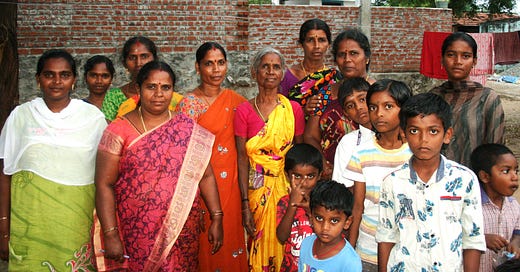Badrakalipuram
Badraklipuram is, in many ways, typical of the Arunthathiyar self-help groups that our new programme is reaching. It is located 30km west of our partner’s headquarters, near the town of Bodiyanakur. The main village of Badrakalipuram has been dominated by a caste who come under the “most-backward caste” category. Over the past few decades, the Arunthathiyars were pushed out to form a separate colony. There are now 65 families living in 55 households. Living conditions are very tough for this community, who are the most marginalised caste in Tamil Nadu. We set up a local self-help group to empower the women to take control of their lives and deal with various problems.
All villages are entitled to basic infrastructure including safe drinking water, communal toilets, burial grounds, community halls, temples and a bus stop. They are also entitled to obtain a house patta document, which grants them official ownership of their homes. These are basic rights that all villages should expect and yet, as in many villages we work in, there are serious deficiencies on many of these fronts. Villages can petition the local government administration, known as the panchayat, for resources that are allocated for rural development. The main issue for Badrakalipuram is that another colony of families from the dominant caste has been set up down the road and conflict over resource access has caused repeated problems. The dominant caste siphon off most of the good water, they have co-opted the public toilets and they have had a newly built road and bus stop in their colony using panchayat funds. The far more populous Arunthathiyar colony meanwhile still don’t have a bus stop, their drinking water is often salty and the majority of them have not yet obtained pattas. We frequently encounter the problem that the panchayat ward clerk tends to be from the "Backward caste" community and so they often give favourable treatment to their own caste and neglect the needs of the Dalits.
One of the main tasks we are helping these groups on is in registering with the government for village infrastructure, patta registration and a range of government benefits such as health and education. These rural women have not been educated in such matters and otherwise lack the organisation to go and push the local administrators to achieve access to these rights that they are entitled too. They are also naturally sceptical of public schemes given that their community has been ruthlessly marginalised for centuries. In rural India either you persistently pressure the local government or else you will just be swept away in the bureaucracy and forgotten about. Since we last visited the group before Christmas, they have conducted a “participatory rural appraisal,” which includes a full survey of the houses and families in the colony. They have documented their pressing needs for better infrastructure including their water supply and toilets. We have heled them petition the department of transport who are now due to come and authorise a new bus-stop. Over time, as the group strengthens, they will get better at securing the resources they are entitled to and be in control of developing their colony.
Another important part of our work is helping these women to achieve sustainable forms of income generation. Many of the Arunthathiyar women in Badrakalipuram have very temperamental means for income generation. Some of them used to have animal husbandry in the old village but have not managed to get it going in the colony. Most get part time work earning a pittance as agricultural labourers. A big problem resulting from this, and we see time and again in the groups we work with, is exploitation by money lenders. Money lenders come in and prey on these women, giving them high loans with 10-15% interest rates per month, which they have little hope of paying off. Vaisnavi took a loan to pay for some medical supplies for her daughter who had fallen ill. She is still in debt, with mounting interest and the lenders come and verbally abuse her each morning in front of the whole colony and her children. They shout caste slurs at her like "sakiliya" (low-caste dog) and jeer at her to prostitute herself in order to earn some money to pay off the loan.
The solution to this problem is self-help groups that provide affordable credit by pooling members savings into a shared fund and accessing bank and other loans. These low cost loans can be used to start microenterprises or to pay off the predatory money lender debts. This change in behaviour takes time to be adopted. Older and more experienced SHGs have been successful in fending off the money lenders. We provide seed money to contribute to the group’s fund and train them in sustainable income generation We have asked the groups what kinds of income generation activities they want. We are looking into whether we can help these women form a business by making candles. We provide them the raw materials and manufacturing training and help with distribution. Starting small, they will slowly develop a sustainable fund.
Ultimately these new Arunthathiyar SHGs will join the federation TSPI who have 290 groups functioning and who also have a wider pool of rotating funds. Many of the groups are self-sufficient and get loans from development banks instead of relying on donations. But, for the time being, there are still many Arunthathiyar groups who need some aid from organisations like our partners to help them get going and regain control of their village resources, get ownership of their homes, attain sustainable incomes and fend off the predatory money lenders.
To donate for women's empowerment in India please click on https://goto.gg/61393





